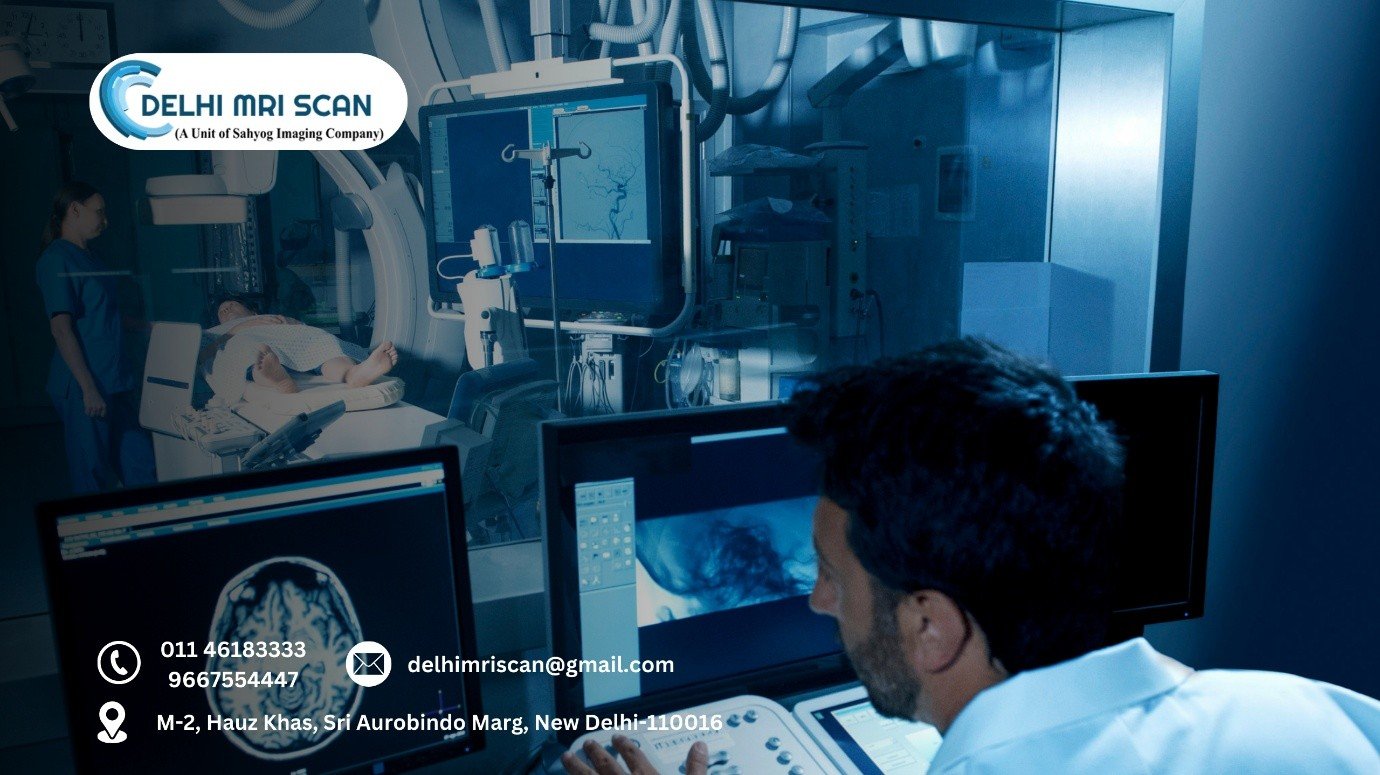Aug 15, 2025
AI in Radiology: How Artificial Intelligence Improves Scanning Accuracy
Accurate diagnosis has always depended on medical imaging, and as technology advances, so does the capacity to identify and treat illnesses early. Using state-of-the-art innovations is part of Delhi MRI Scan's dedication to offering accurate, dependable, and patient-friendly diagnostics. In recent years, one of the most revolutionary developments has been the incorporation of artificial intelligence in radiology, a development that is revolutionizing healthcare and greatly increasing scanning accuracy.
The Role of Radiology in Modern Medicine
In order to diagnose conditions ranging from fractures to tumours, cardiovascular issues, and neurological disorders, radiology is essential. Imaging tests like MRIs, CT scans, ultrasounds, and X-rays have been used for decades to help doctors make life-saving choices. Human limitations, such as weariness, misinterpretations, or difficulties identifying minute changes in scans, can also affect radiology. This is where artificial intelligence in radiology contributes as a trustworthy collaborator to radiologists, improving accuracy and productivity.
What is Artificial Intelligence in Radiology?
The use of computer algorithms that can learn, analyse, and interpret data with little assistance from humans is known as artificial intelligence in the healthcare industry. Large medical image datasets are used to train AI systems in radiology. Based on intricate imaging features that might be invisible to the human eye, these systems are able to identify patterns, identify anomalies, and even forecast the course of a disease.
The utilization of artificial intelligence in radiology implies that scans are more than just images; they are now actionable data that helps doctors make better and quicker decisions.
How AI Enhances Scanning Accuracy
1. Early Detection of Diseases
AI's capacity to identify illnesses earlier than conventional techniques is among its most significant advantages in radiology. Algorithms driven by AI can detect microscopic tumours, lesions, or microcalcifications that a regular review might overlook. For instance, early cancer detection is crucial in oncology, and AI tools increase the likelihood of finding cancers before they spread. By improving overall scanning accuracy, this integration guarantees prompt treatment.
2. Reducing Human Error
In high-volume settings where hundreds of scans are reviewed every day, even the most seasoned radiologists may overlook anomalies. By serving as an additional pair of eyes, artificial intelligence in radiology lessens the possibility of oversight. Radiologists can concentrate their attention where it matters most because AI systems can promptly flag suspicious areas.
3. Enhanced Image Reconstruction
AI enhances scan generation in addition to interpretation. AI-driven reconstruction improves clarity, sharpens details, and lowers noise in MRI and CT images. As a result, patients experience less radiation exposure and discomfort and obtain higher diagnostic value images with fewer scan repetitions.
4. Personalized Diagnostics
No two patients or disease presentations are alike. To provide individualized diagnostic insights, AI systems can evaluate imaging data in conjunction with lab results, genetic profiles, and patient histories. The technology improves scanning accuracy and assists physicians in providing more individualized treatment plans by customizing results to each case.
5. Workflow Optimization
AI significantly improves radiology in terms of efficiency in addition to accuracy. AI programs are able to prioritize urgent cases, pre-sort scans, and even produce preliminary reports. This guarantees that patients in critical conditions receive timely care while also saving radiologists time. In the end, this efficient process preserves accuracy while producing better results.
Key Applications of Artificial Intelligence in Radiology
Cancer Imaging
AI has shown great promise in imaging for cancer. AI systems can detect cancerous lesions with high sensitivity in a variety of imaging tests, including lung CT scans and mammograms. By raising the rate of detection, artificial intelligence in radiology increases the likelihood of survival by enabling early diagnosis.
Neurological Imaging
AI helps identify strokes, haemorrhages, and degenerative diseases like Alzheimer's disease in brain imaging. AI algorithms can identify subtle changes in blood flow or brain structure that are frequently too subtle for the human eye, allowing for precise and prompt intervention.
Cardiovascular Imaging
Globally, heart disease continues to be a major cause of death. AI systems can examine MRIs, CT scans, and echocardiograms to find obstructions, malfunctioning valves, or irregular heartbeats. Both diagnosis and treatment planning are enhanced by this accuracy.
Musculoskeletal Imaging
AI also helps assess degenerative diseases like arthritis, fractures, and joint injuries. AI guarantees that patients receive the appropriate care without needless delays by distinguishing between minor and serious injuries.
Benefits for Patients and Doctors
Both patients and healthcare professionals can benefit directly from the application of AI in radiology:
- Faster results: Patients wait for reports for shorter periods of time.
- Greater accuracy: Better diagnoses are the result of increased scanning accuracy.
- Cost efficiency: AI lowers overall healthcare costs by minimizing needless repeat scans.
- Doctor support: While routine analysis is automated, radiologists can concentrate on complex cases.
Challenges and Ethical Considerations
While the potential of artificial intelligence in radiology is immense, challenges remain. Large amounts of training data are necessary for AI systems, and dataset biases can impair performance. Furthermore, radiologists are supposed to be supported by AI, not replaced. The long-term viability of the technology depends on upholding moral principles, protecting patient privacy, and winning over the public.
The Future of AI in Radiology
AI in radiology is only getting started. Integration with robotics, predictive analytics, and sophisticated telemedicine platforms are probably going to be part of future developments. Imagine artificial intelligence (AI) systems that, using global medical data, not only identify diseases but also suggest particular treatment courses. As the field develops, the artificial intelligence in radiology will transform from a supplementary instrument to a key component of diagnostic medicine.
Final Summary
AI will not replace radiologists; rather, it will equip them with tools that improve patient care, accuracy, and efficiency. It is raising the bar for diagnostic imaging by lowering human error, enhancing image quality, and promoting early detection. By adopting such innovations, Delhi MRI Scan shows that it is committed to fusing technological advancement with human expertise to provide patients with the most accurate and dependable care possible.






